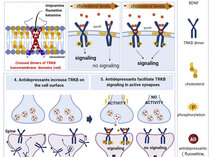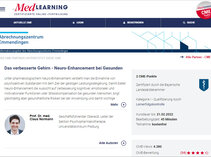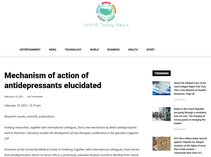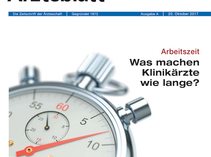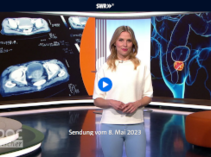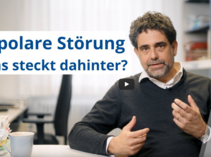Research group Normann / Vestring
Mechanisms of Depression| Research group leader: | Prof. Dr. Claus Normann Email: claus.normann@uniklinik-freiburg.de Dr. Stefan Vestring Email: stefan.vestring@uniklinik-freiburg.de | |
| Group members: Basic-scientists: | PostDoc: Dr. Maxim Veleanu PhD-student: Msc. Viktoria Galuba PhD-student: Louise Schubert Masterstudent: Guilermo Suarez Masterstudent: Prejwal Prabhakaran | |
| Physicians: | PD Dr. Juan Carlos Baldermann-Weiß Dr. Felix Mülsch Dr. Jan Paulus Dr. Manuela Hamoudi Dr. Lydia Mertens | |
| Psychologist: | Dr. Nicola Thiel | |
| Doctoral students: | Sabine Voita Alejandro Aguilera Anouk Ihle Franziska von der Decken Lotta Borger Jakob Brandl Kathleen Karkossa Julia Elicker Dagmar Kilgus Anna Li Doniali Tarhini David Weigel Clara Schünemann Paul Rossner Elisa Deiss Dorothea Bader Janina Frenk Jonathan Vogt Anne Alex Viktoria Chauvard Samira Assaad Dib Sarah Hag Victoria Heer Judith Bernhardt | Magdalena Neureither Fabian Hummel Martin Bronnec Clotilde Vivet Stella Zimermann Lea Smoltzyk Odile Sorg Annika Oligschläger Juliana Zelder Anne Zeien Anna Catarata Rebecca Heck Maguerite Anselin Pauline Löwe Anna Schnecking Magalie Müller Lara Schwarzenberg Rouven Schmalz Nadine Kirbach Anna Sita Berger Lisa Charlotte Bauer Thibault Meisenbach Gabriel Burgos Kim |
| Other Members: | Florian Mainberger (Biologist) Manfred Weber (Study nurse) | |
| Collaborations: | ERA-NET Neuron Prof. Josef Bischofberger, Basel Prof. Eero Castrén, Helsinki Dr. Tsvetan Serchov, Strassbourg Prof. Shira Knafo, Negev Prof. Dr. Andreas Vlachos, Freiburg Prof. Markus Heinrichs Prof. Christoph Nissen, Bern Dr. Jan Wolff, Braunschweig Prof. Dominik Elverfeldt, Freiburg Prof. Dr. Bernd Fakler, Freiburg Prof. Igor Branchi, Rome euroModulBasics, Freiburg German Center for Brain Stimulation CBASP Network DG-IPT DGBS | |
Research focus
We have successfully combined expertise in clinical psychiatry and psychotherapy, neuropsychopharmacology and basic science to develop a translational approach in order to understand the pathophysiology of affective disorders and to develop novel treatment strategies for major depression. Our research group was among the first to develop and to support the neuroplasticity hypothesis of depression. Starting from a basic science approach with a focus on long-term synaptic depression (LTD), we soon discovered a facilitation of LTD and an inhibition of long-term synaptic potentiation (LTP) in different animal models of depression and early stress, which were effectively restored by different classes of antidepressants. We have characterized novel targets for antidepressant action, including Ca2+ channels, TrkB receptor, mGluR, NMDA receptor subunits. In a translational approach, we have developed and examined methods to assess correlates of synaptic plasticity in healthy humans and depressed patients; including the characterization of therapeutic mechanisms. A neuroplasticity approach to explain and to treat depression highlights the importance of interactions between disorder, treatment and environment. Moreover, it suggests effective ways to augment psychotherapeutic approaches by medication and brain stimulation; hereby providing a science based reconciliation between the schools of biologically and psychotherapeutically oriented psychiatrists. We combine clinical psychiatry and psychotherapy with advanced basic science; thus allowing real bench-to-bedside translation. Our final aim is to contribute to an integrative, science-based and effective treatment of major depression.
Research projects
1. Basic mechanisms of synaptic plasticity
Mechanism of associative LTD, role of astrocytes in LTP, calcium influx pathways, modulation of different forms of synaptic plasticity in the hippocampus.
2. Synaptic plasticity in animal models of depression
Behavioral assessment and synaptic plasticity in animal models of depression and early stress.
3. Modulation of synaptic plasticity by antidepressants
Multidimensional approach assessing the modulation of synaptic plasticity by antidepressants and rapid-acting antidepressants, behavioural methods and electrophysiological recordings. Identification of novel targets for antidepressant action (TrkB receptor, mGluR, NMDAR subunits)
4. Correlates of synaptic plasticity in humans
Translational assessment of brain plasticity in healthy controls and depressed patients by visually evoked potentials, transcranial magnetic stimulation, imaging and behavioral methods.
5. Augmentation of psychotherapy and effect of environmental factors on mood disorders
D-Cycloserine in depression, social cognition and influence of positive and negative external stimuli in states of altered plasticity. Role of oxytocin in mood disorders.
6. Treatment of chronic and therapy-resistant depression
Extensive research on CBASP for chronic depression, implementation of in-patient treatment programs for chronic depression and TRD, pharmacotherapy for TRD and bipolar disorder. Brain stimulation: clinical and preclinical ECT, tDCS and rTMS research
7. Health economics
Funding of psychiatric care, AI-based prediction of treatment outcomes and pharmacological trajectories
Research methods
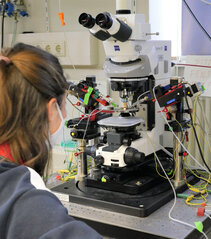
Laboratory research
Electrophysiology and calcium imaging
Patch-clamp technique, focus on synaptic plasticity
Fluorescence imaging
Fiberphotometry
Morphology
Single cell dye fillings, microelectrophoresis
Immunofluorescent and native stainings
Molecular biology
Standard molecular biology techniques (PCR, WB, cell culture)
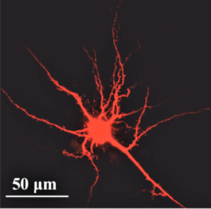
Animal behavioural experiments
Behavioral animal models of depression
IntelliCage
Readout methods
Escape behaviour
Learning tasks (object location memory, novel object test, Maze tests)
Reward/anhedonia (sucrose preference test, nose pokes sucrose preference)
Locomotion/anxiety (Open Field Test)
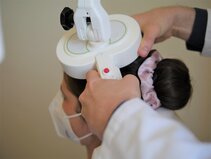
Clinical research
Assessment of plasticity in humans
Visually evoked potentials (VEPs)
Paired associative Stimulation (PAS)
Different learning tasks (TDT, fear conditioning, motor learning)
Phase II to IV and IIT clinical trials in MDD, bipolar disorder, psychosis, psychotherapy. Continuous GCP/ICH certification.
Medical dissertations and master projects
Many medical dissertations and master projects have been successfully finished in our lab or clinical projects. We are constantly recruiting new students. The projects are intensely supervised. Please apply by mail (viktoria.galuba@uniklinik-freiburg.de).
» Information about promotions (PDF in German)
News in the media
Current Funding
- ERA-NET-Neuron (coordination) an EU funded project
- Go Bio-initial a BMBF funded project
- Hans-Böckler-Stiftung
- Berta-Ottenstein-Stiftung
- Industry funds as investigator in > 20 clinical trials
Peer-reviewed publications
132 original publications, 7482 citations, h-index 43 (Google Scholar)
» Full List of Publications in PubMed
Selected peer-reviewed publications
- Vestring, S., Galuba, V., Kern, E., Voita, S., Berens, F., Nasiri, D., Domschke, K., & Normann, C. (2024). Ketamine in multiple treatment-resistant depressed inpatients: A naturalistic cohort study. Journal of affective disorders, 350, 895–899. doi.org/10.1016/j.jad.2024.01.165
- Vestring, S., Dorner, A., Scholliers, J., Ehrenberger, K., Kiss, A., Arenz, L., Theiss, A., Rossner, P., Frase, S., Du Vinage, C., Wendler, E., Serchov, T., Domschke, K., Bischofberger, J., & Normann, C. (2024). D-Cycloserine enhances the bidirectional range of NMDAR-dependent hippocampal synaptic plasticity. Translational psychiatry, 14(1), 18. doi.org/10.1038/s41398-023-02725-7
- Reif, A., Bitter, I., Buyze, J., Cebulla, K., Frey, R., Fu, D. J., Ito, T., Kambarov, Y., Llorca, P. M., Oliveira-Maia, A. J., Messer, T., Mulhern-Haughey, S., Rive, B., von Holt, C., Young, A. H., Godinov, Y., & ESCAPE-TRD Investigators (2023). Esketamine Nasal Spray versus Quetiapine for Treatment-Resistant Depression. The New England journal of medicine, 389(14), 1298–1309. doi.org/10.1056/NEJMoa2304145
- Burkhardt, G., Kumpf, U., Crispin, A., Goerigk, S., Andre, E., Plewnia, C., Brendel, B., Fallgatter, A., Langguth, B., Abdelnaim, M., Hebel, T., Normann, C., Frase, L., Zwanzger, P., Diemer, J., Kammer, T., Schönfeldt-Lecuona, C., Kamp, D., Bajbouj, M., Behler, N., … Padberg, F. (2023). Transcranial direct current stimulation as an additional treatment to selective serotonin reuptake inhibitors in adults with major depressive disorder in Germany (DepressionDC): a triple-blind, randomised, sham-controlled, multicentre trial. Lancet (London, England), 402(10401), 545–554. doi.org/10.1016/S0140-6736(23)00640-2

